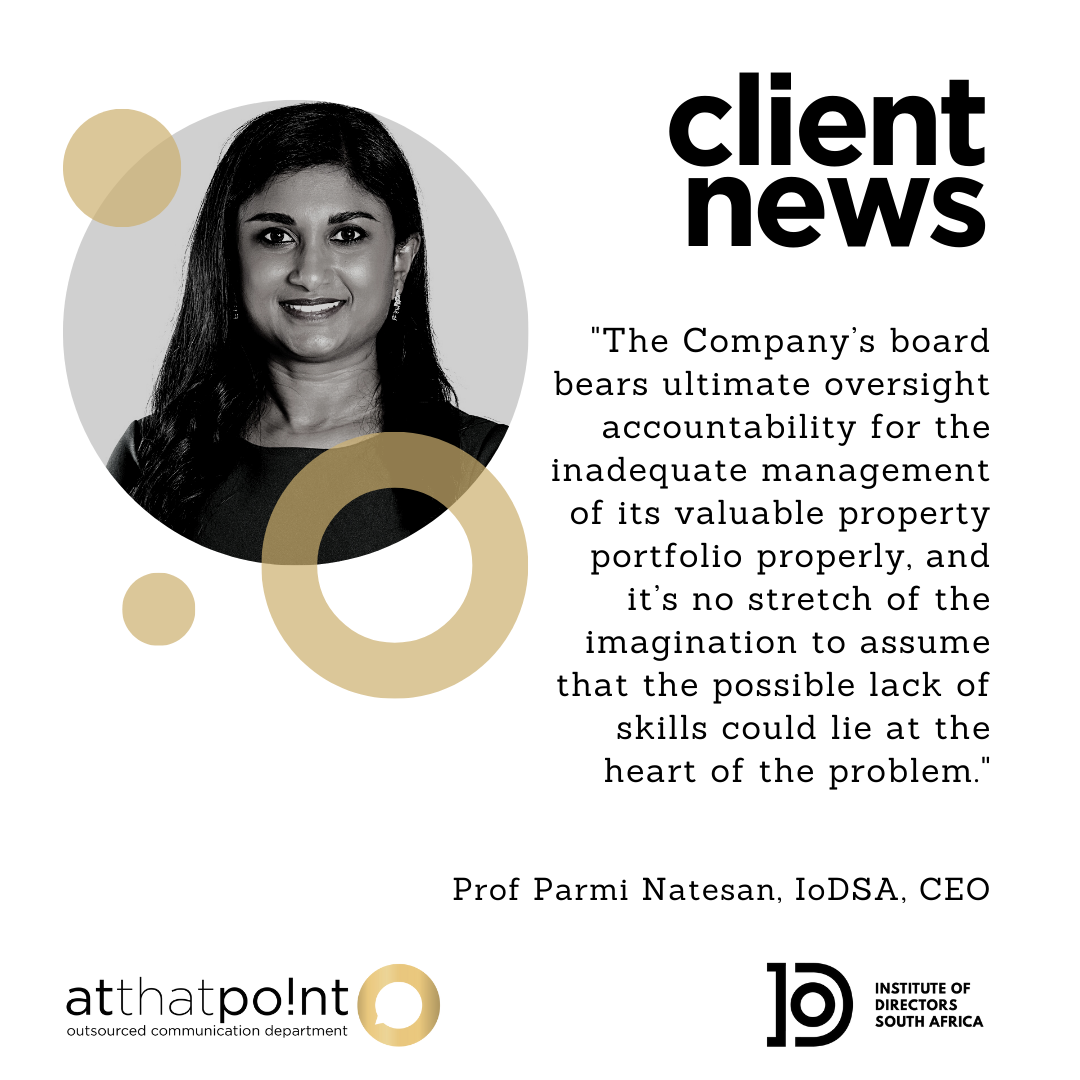 A slew of recent media reports indicate that the Johannesburg Property Company has appointed several individuals to its board who, on the face of it, do not possess the necessary skills to govern a significant municipal entity with a property portfolio worth an estimated R8.7 billion. These appointments, which are reported to include a receptionist, a cashier and a person without matric, appear to have been made unilaterally by the MMC for Economic Development. “The Johannesburg Property Company manages 30 000 properties, many of which have reportedly been hijacked—in fact, the devastating Albert Street fire that claimed 77 lives was apparently one of them. The Company’s board bears ultimate oversight accountability for the inadequate management of its valuable property portfolio properly, and it’s no stretch of the imagination to assume that the possible lack of skills could lie at the heart of the problem,” says Professor Parmi Natesan, CEO of the Institute of Directors in South Africa (IoDSA). “Media reports also suggest that the MMC treats the company as a private fiefdom to which political cadres are appointed, based presumably on their loyalty and political importance, and not necessarily their skills as directors. The sad state of municipal entities across the city, and indeed the country, shows the devastating consequences of flouting robust nomination processes for board and senior executive positions.” The IoDSA has repeatedly pointed out that public sector entities face particular challenges when it comes to appointing competent boards. The state, as the sole shareholder, has not been seen to follow best practice in this regard. According to King IV, directors should have the correct mix of skills and experience to discharge their legal duties. A robust and transparent nomination process that includes in-depth vetting of candidates should be followed, says Professor Natesan. “Without such a nomination process, the board members can hardly act competently and independently in order to fulfil their legal duties, which are to the company and not to whoever appointed them,” Professor Natesan says. “I wonder if these directors realise that they can be held personally liable for any untoward decisions they make. Modern-day directors need not only business and sector skills and experience, but also finely honed governance expertise.” The performance of local government generally, including municipal entities like the Johannesburg Property Company, has a direct bearing on service delivery and thus on the most vulnerable sectors of society. The Auditor-General’s Consolidated General Report on Local Government Audit Outcomes 2021-22, an annual report on audit outcomes for entities governed by the Municipal Finance Management Act, notes that fruitless and wasteful expenditure continues to balloon. It doubled in 2021-22 to R4.74 billion, plus an estimated R5.19 billion in financial loss from non-compliance and fraud. It is clearly imperative that municipalities and municipal entities are properly governed, and the Auditor-General highlights the need for competent people to be appointed to municipal structures, and for governance to be strengthened. “The Johannesburg Property Company is just one of many municipal entities that are perceived to be – and often are – underperforming, with one of the reasons for that underperformance reasonably assumed to be that board appointments are not necessarily made with the entity’s needs in mind,” she argues. “These entities need proper governance and strong oversight or they are likely to fail to do their jobs, with disastrous consequences for society and our country.” ENDS MEDIA CONTACT: Idéle Prinsloo, [email protected], 082 573 9219, www.atthatpoint.co.za For more information on the IoDSA please visit: Website: www.iodsa.co.za Twitter: @The_IoDSA LinkedIn: Institute of Directors in South Africa Company Page Facebook: Institute of Directors South Africa
0 Comments
 Futuregrowth Asset Management recently raised concerns about the inordinate time it is taking to fill six vacant positions on the Transnet board. These concerns are valid and point to governance issues that should be seriously considered by all boards, says Parmi Natesan, CEO, Institute of Directors in South Africa (IoDSA). “Futuregrowth’s analysis shows that the failure to fill six vacancies in a 12-person board has made it less able to tackle the serious challenges the company faces—a matter of considerable concern given its pivotal role in our economy,” she points out. “In the best of times, a board needs the right mix of skills to steer the organisation well, but in a tricky economic climate and facing significant challenges, the lack of board skills is existential.” For a start, Transnet’s sparsely populated board table means that important board committees like the audit committee, social and ethics committee, and risk committee could be missing critical skills. These committees fulfil vital roles in the governance of the organisation, and particularly in relation to its ability to rise to the challenges it faces. “Organisations and board chairs must pay particular attention to the need for the board to have, in the words of King IV, ‘the appropriate balance of knowledge, skills, experience, diversity and independence for it to discharge its governance role and responsibilities objectively and effectively’ (Principle 7),” Natesan says. A related issue is the fact that the terms of office of the six remaining non-executive directors will expire in May 2024. While the principle of rotating board members in a staggered fashion to ensure that skills are renewed and diversity improved is a good one, it is clearly counterproductive for so many board members to leave at once. “We see this kind of mass reshuffling of boards particularly in the public sector. The motivation behind rotation is good, but it needs to be handled intelligently to ensure that invaluable institutional memory is not lost,” she says. “Organisations need to focus on striking a balance between continuity and renewal.” Another important consideration is succession planning. If board members are going to be rotated regularly, as best practice suggests, then the organisation needs to ensure that individuals with the right skills—including professional directorial skills—are ready in the wings. Succession planning thus needs to proceed in parallel with an ongoing skills audit to ensure that the board understands what skills it needs, and that the individuals nominated for it have them. “Nobody in South Africa at least now doubts the important role that governance and oversight play in ensuring organisational health and effectiveness,” Natesan sums up. “The corollary—that the board needs to have the right mix of skills in order to fulfil this vital function—is equally true. ENDS MEDIA CONTACT: Stephné du Toit, [email protected], 084 587 9933, www.atthatpoint.co.za For more information on the IoDSA please visit: Website: www.iodsa.co.za Twitter: @The_IoDSA LinkedIn: Institute of Directors South Africa Company Page Facebook: Institute of Directors South Africa 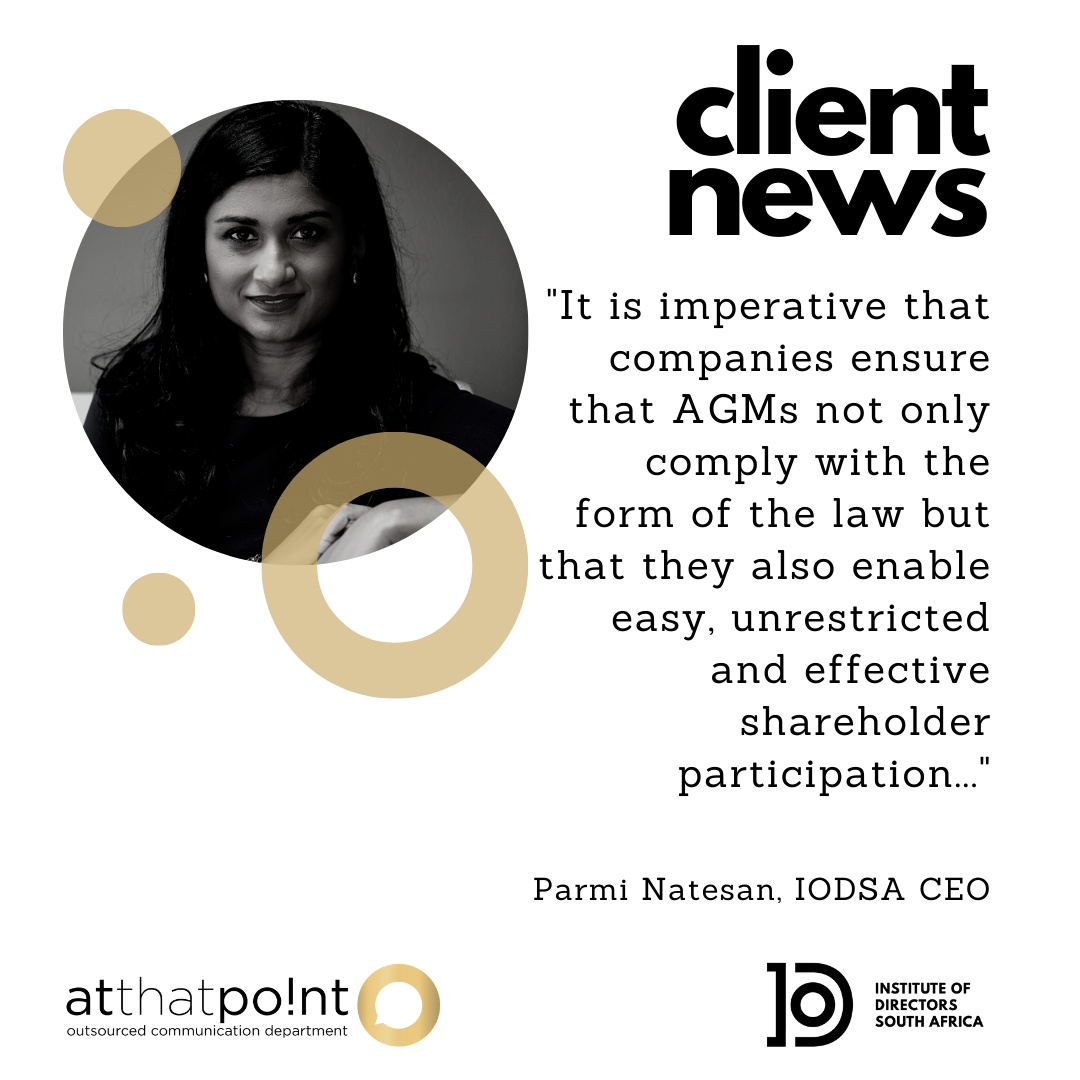 An Annual General Meeting (AGM) of a company that restricts shareholders to use only text-based communication does not constitute an AGM for the purposes of the Companies Act 71 of 2008. This is according to the legal opinion of the Companies and Intellectual Property Commission (CIPC) on holding AGMs via electronic means. According to the opinion, a company holding an AGM with shareholders attending online must allow those shareholders to verbally ask questions in real-time and without an intermediary. This aligns with the IoDSA’s previous comments on this matter, in which we noted that whilst the section does not specifically state that verbal communication is required, the spirit of the section should be interpreted to allow sufficient engagement at the AGM, as would have taken place had the meeting taken place in-person. The Institute of Directors in South Africa (IoDSA) welcomes this clarification from the CIPC. “If you consider the Companies Act and King IV in substance over form, shareholders should have a right to be heard at an AGMs,” says Parmi Natesan, CEO of the IoDSA. “It is imperative that companies ensure that AGMs not only comply with the form of the law but that they also enable easy, unrestricted and effective shareholder participation during the meetings, in substance.” “Whilst engagement between companies and shareholders can take place at any time, the AGM is the key point of formal engagement and the main opportunity for shareholders to exercise their voting rights, raise concerns and ask questions,” explains Natesan. A key, but often neglected voting resolution at AGMs is the appointment of directors. Shareholders have the legal right and obligation to appoint directors to oversee the company. Those directors, in turn, have a legal obligation to act in the company’s best interests and can be held personally liable if they do not do so. A big emphasis at AGMs should therefore be ensuring that the right people are appointed to the board and that they are held properly accountable. Shareholders need to be confident that they are appointing directors in whom they have full trust. They then need to allow these directors to exercise their discretion in the fulfilment of their duties while holding those directors accountable. They should also consider when the removal of a director is appropriate as this is another powerful and important tool that a shareholder has to protect the company’s interests. In relation to the AGM resolution on director appointments, questions asked should therefore be aimed at determining whether board members have the necessary knowledge, skills, experience, independence, personal competencies, track record and even sufficient time available to effectively serve on the board. “In summary, shareholders now have confirmation of their right to be heard at virtual AGMs and are encouraged to use their voice effectively in exercising their voting rights and holding the directors accountable,” says Natesan. ENDS MEDIA CONTACT: Stephné du Toit, [email protected], 084 587 9933, www.atthatpoint.co.za For more information on the IoDSA please visit: Website: www.iodsa.co.za Twitter: @The_IoDSA LinkedIn: Institute of Directors South Africa Company Page Facebook: Institute of Directors South Afric A recent editorial in Business Day raised a perennial governance hot potato: just how many boards should a single individual be able to serve on? The tenor of the article was that the current chair of Capitec should focus on that role, and risked being distracted by chairing two other boards as well.
“The view that the more complex and large an institution is, the more time the chair or board member should have to devote to it has some merit,” says Parmi Natesan, CEO, the Institute of Directors in South Africa. “For example, the decision by the current chair of Eskom to resign as chair of a large bank to concentrate on leading the power utility’s board was probably a wise move. “However, because organisations are of varying sizes and degrees of complexity, and individuals have different capacities, the IoDSA does not believe it makes sense to attempt to create a hard-and-fast rule about how many boards an individual should be able to chair or, indeed, sit on.” She argues that it remains up to each organisation to determine how much time each board member’s role requires, and to ensure that current or prospective board members can commit to that. The individual director’s ability, experience and capacity would also be factors to consider. In addition, board chairs and directors (especially those serving on key board committees) need to have the flexibility to ramp up the time they devote to their work during periods of crisis. Individuals who are fully committed will not have that flexibility. In view of the growing realisation that governance plays a crucial role in ensuring corporate sustainability, investors are starting to take note of how many boards non-executive directors serve on. In the United Kingdom and United States, institutional investors (often via proxy services) oppose the appointment of directors with more than five board seats. In India, by contrast, the legal limit of directorships is 20. King IV addresses the problem by recommending transparency, advising independent non-executive directors to detail their other board commitments and to provide a written undertaking that they have enough time to discharge their board responsibilities (Principle 7, Recommended Practice 18). “Given the importance of the director’s role, it might make sense for boards to formalise the minimum amount of time that each role requires. The overriding principle is that the issue needs to be thoroughly ventilated and minuted to ensure there is consensus about what the role demands, and whether each director can give the time needed,” she concludes. “The Nominations Committee also plays a key role in monitoring the attendance and involvement of board members, and should act swiftly where there are capacity concerns.” ENDS MEDIA CONTACT: Stephné du Toit, [email protected], 084 587 9933, www.atthatpoint.co.za For more information on the IoDSA please visit: Website: www.iodsa.co.za Twitter: @The_IoDSA LinkedIn: Institute of Directors South Africa Company Page Facebook: Institute of Directors South Africa 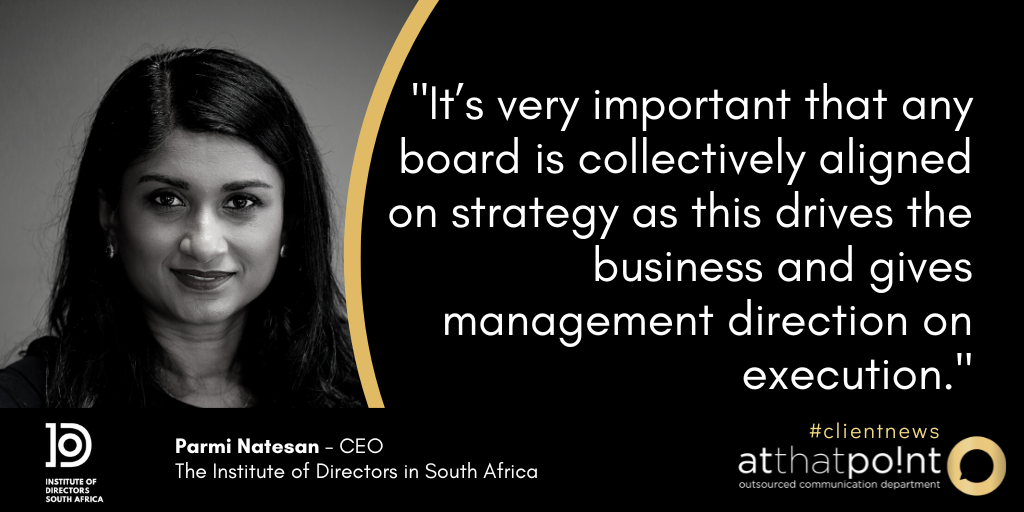 Events at Huge Group, as reported in the media, hold important governance lessons for all organisations, says Parmi Natesan, CEO: the Institute of Directors in South Africa (IoDSA). Reports stated that at a recent board meeting, the chairman and two other directors resigned with immediate effect, apparently over disagreements relating to corporate strategy. “It’s very important that any board is collectively aligned on strategy as this drives the business and gives management direction on execution. It’s therefore not surprising that vehement disagreement on strategy would lead to a parting of the ways,” comments Ms Natesan. “Another obvious takeaway is that the departure of three experienced non-executive directors at once is a major loss of institutional knowledge for any company, something that it will take a long time to recover from—a well-thought-out board succession plan is clearly vital.” When the news of the resignations broke, the simultaneous appointment of three substitute directors was also announced. On the one hand, this may indicate that a succession plan was indeed in place, or it may have been just quick action, Ms Natesan believes. “Whilst the speed of finding replacements is to be applauded, one has to consider whether this was a missed opportunity for better demographic diversification on the board. After the new appointments, the board’s composition remains all male and majority white—this despite both the JSE Listings Requirements and King IV referring to targets and reporting on racial and gender diversity on boards,” she says. There is widespread agreement that a diverse board does more than tick boxes and create a good impression. For example, 86% of respondents in a recent research survey believe that board diversity contributes to better board performance, while 77% link board diversity and improved corporate performance. Overall, 73% of respondents noted that their company was taking action to increase board diversity. The research also indicates that investors are starting to ask questions about board diversity. Globally, just over a third (35%) of investors request such information, with this question most likely to be asked in Europe (43%). Investors are most likely to ask about boardroom diversity in relation to mega-cap (71%) and large cap (57%) companies.[1] “Common sense tells us that the more lenses through which a board can examine the world, the better. There’s also interesting research that links a company’s financial performance and gender and skill diversity on the board,”[2]concludes Ms Natesan. “This is a complex topic, but it’s clear that boards need to investigate it fully and, most importantly, have a succession plan that reflects their conclusions and resulting diversity goals.” [1] Corporate Secretary, “Boardroom diversity: From disclosure to recruitment”, available at https://content.corporatesecretary.com/story/cs-boardroom-diversity-from-disclosure-to-recruitment/page/1. [2] Khaled Hosny, Adel Elgharbawy, “Board diversity and financial performance: empirical evidence from the United Kingdom”, Accounting Research Journal (17 June 2022), available at https://www.emerald.com/insight/content/doi/10.1108/ARJ-02-2020-0037/full/html. ENDS MEDIA CONTACT: Stephné du Toit, [email protected], 084 587 9933, www.atthatpoint.co.za For more information on the IoDSA please visit: Website: www.iodsa.co.za Twitter: @The_IoDSA LinkedIn: Institute of Directors South Africa Company Page Facebook: Institute of Directors South Africa 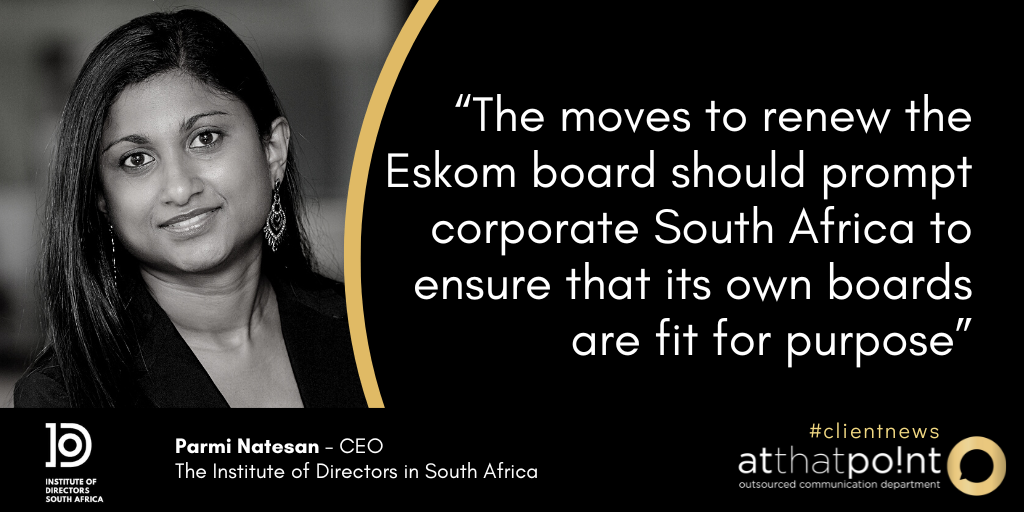 The Minister of Public Enterprises, Pravin Gordhan, has made headlines by announcing that the board of Eskom would be reconstituted and renewed. According to Parmi Natesan, CEO, Institute of Directors in South Africa (IoDSA), the moves to renew that Eskom board should prompt corporate South Africa to ensure that its own boards are fit for purpose, and have the right combination of skills, knowledge and experience to add value to the company. The first step is to assess urgently exactly what skills are needed. Business/financial skills are clearly important, but so are specialist, industry-specific skills—like engineering/energy in the case of Eskom. “Some have commented with disappointment that the country’s sole energy utility had virtually nobody on its board who has domain expertise in its core business,” she says. “This is a basic shortfall that every company should guard against when assessing their board skills matrix.” Boards also need individuals who are skilled in developing and monitoring strategy, and who understand how to monitor effective governance frameworks. More generally, she points out, directors also need to possess skills relating to directorship itself. The IoDSA has long advocated the professionalisation of directorship in response to the increasing importance of the board’s role, and the fact that directors can be held liable in law for their actions. Its Directory Competency Framework provides a guide to the professional skills a director should acquire, and its two professional designations—Certified Director and Chartered Director (South Africa)—provide a structured programme for attaining them, and ensuring they are kept up to date. A particular challenge for public-sector boards is that directors are often replaced as a whole collective unit, leading to a calamitous loss of institutional knowledge and inevitably creating a leadership vacuum until the new board can get up to speed. A programme of staggered rotation, such as is generally followed in the private sector, makes much more sense from multiple points of view. Ideally, the Minister would follow the wise advice of King IV and exercise his power of appointing board members in line with the boards, and ultimately the company’s needs, and not purely in terms of political affiliation. “Boards (and those appointing them, in this case Ministers) should regularly evaluate what skills are needed and whether the Board as a collective in fact possesses them, and then take steps to close any gaps,” Ms Natesan comments. The IoDSA strongly urges boards and shareholders to use this opportunity to take a long, hard look at their board composition, and then take any necessary remedial steps if necessary to make improvements.” ENDS MEDIA CONTACT: Stephné du Toit, [email protected], 084 587 9933, www.atthatpoint.co.za For more information on the IoDSA please visit: Website: www.iodsa.co.za Twitter: @The_IoDSA LinkedIn: Institute of Directors in South Africa Company Page Facebook: Institute of Directors South Africa 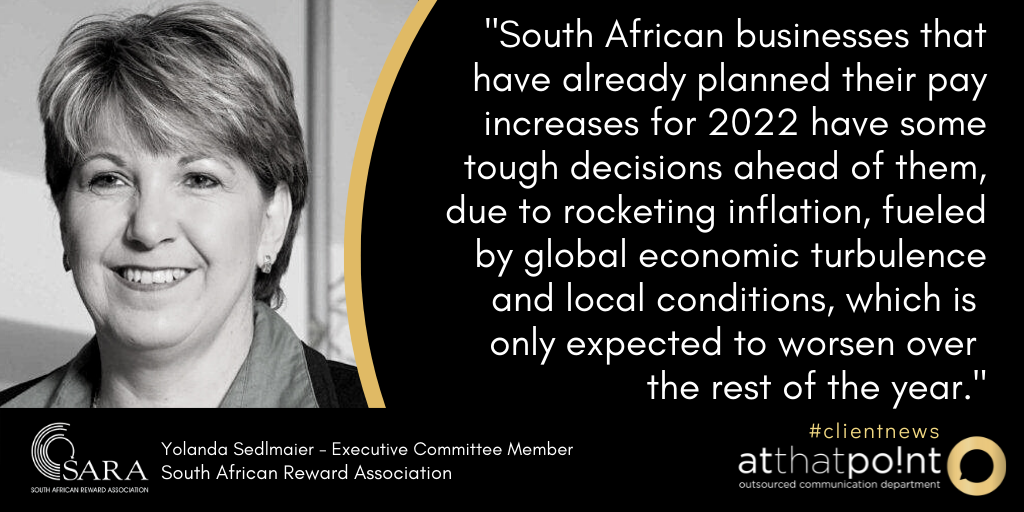 Conclusions and recommendations made in part one of the state capture inquiry report align closely to a letter sent by the Institute of Directors South Africa (IoDSA) to the Zondo Commission in September 2021. The letter included recommendations on director competencies as well as the nomination and selection of directors. Section 580 of the state capture inquiry report mentions that the appointment of board members to SOEs “has proven to be problematic and does not represent the “robust and transparent” process recommended by King IV”. It also highlights the common “disjuncture between the fiduciary duties of SOE board members and the profile, skills and expertise of incumbents”. Section 582 and 583 further explain why “the national interest demands that state owned enterprises operate under efficient and professional leadership which requires that the appointment procedure is transparent, not driven by party political interests but made in accordance with objective criteria”. King IV makes a few important recommendations relating to the governance of the nomination process. The first of these is Recommended Practice 15: “the processes for nomination, election and ultimately, the appointment of members to the governing body should be formal and transparent”. Recommended Practice 16 states that “before nominating a candidate for election, the governing body should consider the collective knowledge, skills and experience required by the governing body, the diversity of the governing body, and whether the candidate meets the appropriate fit and proper criteria”. “While we welcome the alignment between the conclusions of the report and what the IoDSA has been saying for years, we are anxious to see the implementation of the recommendation on the professionalisation of directors,” says Parmi Natesan, CEO of the IoDSA. Professionalising directorship will not automatically eliminate incompetent or corrupt directors any more than professionalising medicine or engineering achieved that goal. It will, however, provide an objective framework for ensuring that directors have the required skills in terms of an objective competency framework, and that they can be disciplined in terms of a professional Code of Conduct. Alongside the professional skills a modern director needs, it is vital that individuals who serve as directors possess the necessary personal qualities. Directors should above all be ethical, independent and courageous. Courage and independence are particularly necessary because directors must put the interests of the organisation first, and this may mean going against the interests of the parties which appointed them or, indeed, their own interests. “Our highly respected director development programmes, Certified Director (SA) and Chartered Director (SA) designations, and governance advisory services are available immediately to support the implementation of the recommendations made by the Commission,” says Natesan. ENDS MEDIA CONTACT: Idéle Prinsloo, 082 573 9219, [email protected], www.atthatpoint.co.za For more information on the IoDSA please visit: Website: https://www.iodsa.co.za/ Twitter: https://twitter.com/the_iodsa LinkedIn: https://www.linkedin.com/company/institute-of-directors-in-southern-africa Facebook: https://www.facebook.com/TheIoDSA 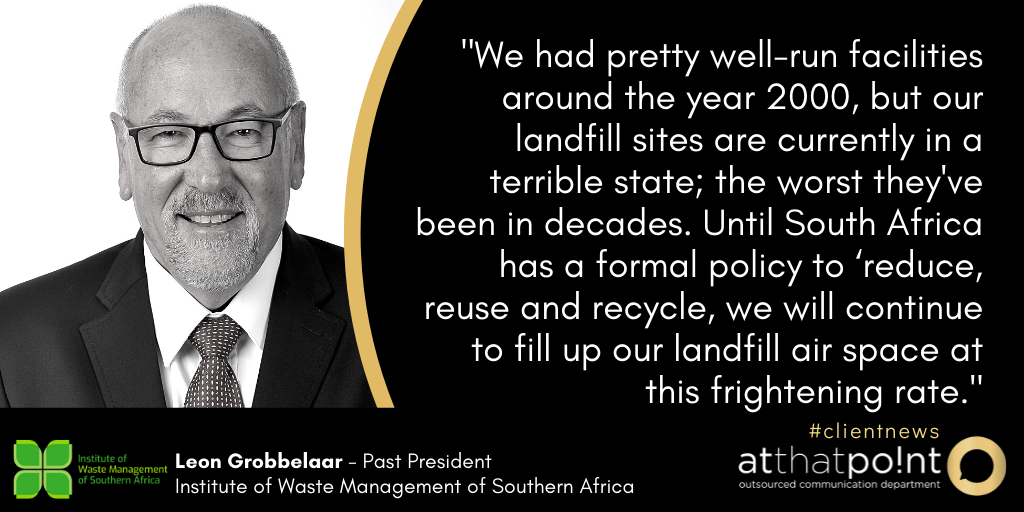 More laws and regulations are not going to solve the many problems business—and the country—face. Only changed behaviour will do that. Authored by Parmi Natesan, CEO, Institute of Directors in South Africa (IoDSA) Reading through the proposed amendments to the Companies Act again, it struck me that they are symptomatic of a general South African problem: too much regulation, too few results. No doubt some of these amendments are necessary, but will they actually address the big issues that concern us all? It’s doubtful. We already have a huge legal superstructure, and yet corruption, corporate wrongdoing and all sorts of other shenanigans continue to dominate the headlines. Rules are obviously important. But no matter how well drafted or necessary, they will not be effective if they are out of sync with the surrounding culture, and if they are not implemented by people with the right skills and attitude, with visible consequences for transgressions. In addition, if there are too many onerous laws and regulations then businesses (and citizens, in the end) begin to find them burdensome and turn either to mindless compliance or outright circumvention. One example that will prove my point is the proposal to mandate the disclosure of pay gaps between the highest and lowest earners. The intent—addressing the social inequality prevalent in the country—is certainly necessary, but this is a complex issue not solvable simply by a set of rules. One might argue that if the wage gap is the outcome of a faulty economic system, then fixing it requires the fundamentals to be addressed—simply disclosing the wage gap in isolation is futile. Disclosure needs to be complemented by policy change and a mechanism for monitoring how the gap has changed over time. We also need to agree that a wage gap will always exist, but what the parameters of an acceptable wage gap look like. As it now stands, the current proposals risk a slew of unintended consequences. One is the real possibility that they would simply speed up the brain drain as top executives move to jurisdictions where earning high rewards is less complicated or threatened. The proposals could also prompt companies to restrict the hiring of junior employees and outsource lower paid employees in order to improve the gap between highest and lowest paid. Some companies could even relocate to avoid rules that are perceived to make doing business more difficult. Losing companies and executives, not to mention jobs and taxpayers, would surely be an unintended—and highly negative—consequence. One final point that needs to be made. With the latest official unemployment figures standing at 34.9%, focusing on the wage gap seems a little unbalanced given that a third of our people are without any job at all. Changing hearts and minds The phenomenon of overregulation is widely recognised as something that needs to be solved. President Ramaphosa has set a target for South Africa to better its ranking in the World Bank’s Ease of Doing Business Index, from 82 to 50. Part of the solution is surely to cure our addiction to solving problems by making new laws, and rather find ways to change how organisations and the people within them think and behave. Corporate governance codes provide a useful example of an alternate approach. Having started off with a somewhat compliance-based approach, the King Reports on Corporate Governance have mutated into something quite different: King IV has moved decisively from being a set of “rules” that ought to be complied with (often while circumventing the spirit of the rule) to a set of outcomes that are aspirational. In parallel, the emphasis has shifted to requiring an explanation of which recommended practices have been applied in order to achieve each principle, and away from the simple implementation of static requirements. Substance over form, in other words. King IV thus ultimately aims to change the culture of the organisation, and how it does business. We are not there yet, of course, but if stakeholders and the overall social context demand it, it will happen. A prerequisite will be that corporate and government leaders begin to embody a culture based on ethical and effective leadership that in the end supersedes the “rules”. The importance of the outcomes-based approach embodied in King IV can hardly be overstated. One of its main advantages is that it is non-prescriptive and flexible, allowing organisations latitude in how they go about applying the code’s principles so long as they explain what their thinking was and what progress they have made. Unfortunately, since its launch, we have not seen disclosure with the depth intended by the Report. To conclude, I want to emphasise that a solid body of good laws remains an essential foundation for a vibrant economy and a just society, but it cannot succeed unless the surrounding culture also changes. Instead of putting more laws on the statute books, government should be focused on making it easier to do business and supporting efforts to change the culture that pervades business, and the nation at large. Absent that, we will not address the real issues—inequality, financial inclusion, environmental stewardship and so on—while risking a further contraction of the economy with everything that would entail. ENDS MEDIA CONTACT: Idéle Prinsloo, 082 573 9219, [email protected], www.atthatpoint.co.za For more information on the IoDSA please visit: Website: www.iodsa.co.za Twitter: @The_IoDSA LinkedIn: Institute of Directors in Southern Africa Company Page 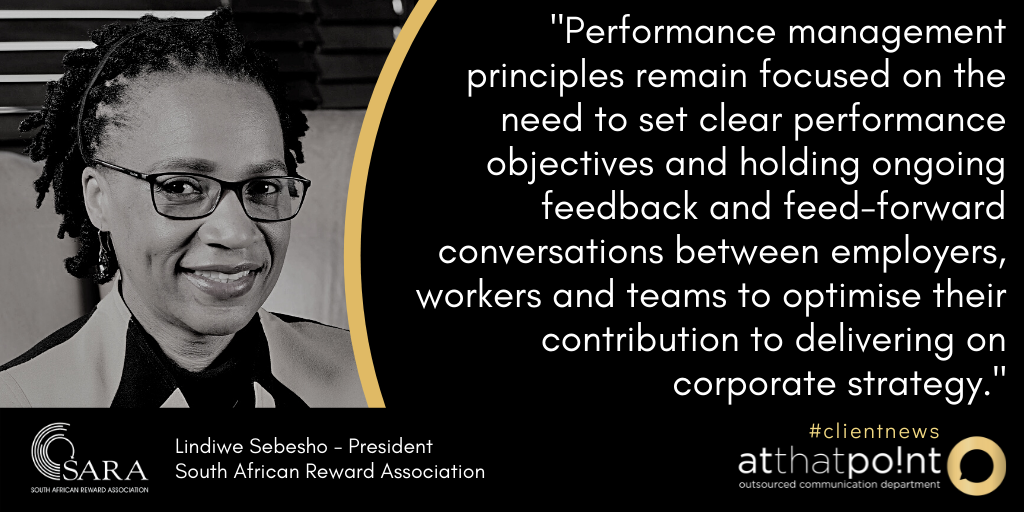 The decision by the board of Absa to remove Sipho Pityana has provoked an enormous amount of controversy and a great deal of debate. Parmi Natesan, CEO of the Institute of Directors in South Africa (IoDSA) says that the public needs to ensure it understands the law relating to the removal of a director, but that it also takes into account the complexities of the decision process the board would have undertaken. “The legality of Mr Pityana’s removal from the Absa board will be decided in reference to the stipulations of the Companies Act, which provides the conditions under which such an action may be taken,” she says. In terms of the Companies Act, there are two ways to remove a director. One is for the shareholders of the company to adopt an ordinary resolution at a shareholders’ meeting. The persons entitled to exercise voting rights in the election of a director would be eligible to vote in this matter. Alternatively, as was the case in this instance, the board can remove a director via a board resolution if a director or shareholder has alleged that the said director has become ineligible or disqualified from sitting on the board; is so incapacitated that he or she cannot perform directorial functions and is unlikely to regain that capacity within a reasonable time; or has neglected or been derelict in performing his or her directorial functions. In both cases, the affected director needs to be given notice of the meeting and the content of the resolution, as well as reasonable opportunity to make a presentation prior to the vote taking place. “We live in the Age of Social Media, and we are often quick to form and then voice strong opinions. In this instance, the Companies Act lays down the framework under which a director may be removed from office; and there is a due process to be followed,” she says. “In addition, even after the decision, the director concerned has the right to apply within 20 business days to a court to review the determination of the board.” We will now wait and see how this further legal process unfolds. This is a highly complex case, with many issues to be taken into consideration. One thing is clear though—boards have to take tough decisions if they believe it is in the best interests of the company, while staying within the lines of the law. Whether this was the case is a matter for the experts to decide, and we should let them do so. ENDS MEDIA CONTACT: Idéle Prinsloo, 082 573 9219, [email protected], www.atthatpoint.co.za For more information on the IoDSA please visit: Website: www.iodsa.co.za Twitter: @The_IoDSA LinkedIn: Institute of Directors in Southern Africa Company Page  Recent events in both the public and private sectors are again highlighting the key role that proper succession planning plays in supporting any organisation’s sustainability, particularly when it comes to CEOs and governing-body chairs. Poor succession planning inevitably creates a leadership vacuum at both governing body and executive management level resulting in a loss of the longer term strategic focus. The impacts of this uncertainty can be dire, says Richard Foster, facilitator at the Institute of Directors in Southern Africa (IoDSA). Impacts can include a loss of performance delivery influenced by such factors as possible churn at the senior management level, the loss of market share to more focused competitors, severe reputational damage and erosion of investor and other key stakeholder confidence in both the governing body and senior management alike. “Because good governance relies on effective leadership, succession planning receives significant focus in King IV. In addition, its five sector supplements deal with the specific issues relating to succession planning in different contexts,” Mr Foster notes. The position is particularly complex when it comes to state-owned entities (SOEs) because certain appointments like the CEO and governing-body chair are typically mandated in legislation or founding documents. The shareholder thus plays a key role, and the process is not as easily aligned with what is considered governance best practice, he says. A similar situation exists in local government. One mark of the difficulties of proper succession planning at SOEs is the reliance on interim appointments. However, they inevitably create uncertainty unless they are well thought-through and the process is properly communicated to stakeholders. “One of the governing body’s primary functions is to create and oversee the implementation of strategy, implying a three-to-five-year, or even longer timeline. Interim appointments, by contrast, tend to be operationally focused pending a permanent appointment,” he says. King IV recommends that governing bodies should ensure succession plans exist for their own members, as well as for the CEO and executive management team. However, because succession planning is intimately connected with the appointment of these senior office-bearers, succession planning for SOEs is, as previously mentioned, more complex and challenging. Typically, the shareholder/executive authority (ultimately the government) has the power (or obligation) to appoint the chair and/or the CEO and/or other governing-body members. In its SOE Sector Supplement, King IV recommends that these appointments should be accomplished via a robust and transparent process that involves the governing body (the accounting authority) as much as possible to give effect to the aspirations of the relevant principle. “The processes for appointing CEOs or chairs at certain SOEs is sometimes questioned. The damage caused by unsuitable appointments is now plain, and both the organisations and the economy as a whole are affected,” he says. To align succession planning in SOEs better with governance best practice, the King IV SOE Sector Supplement recommends that the CEO’s letter of appointment should clearly state that the CEO is accountable to the governing body (rather than the executive authority i.e. shareholder), that the governing body and CEO jointly agree on how the CEO’s performance should be measured, and that the governing body has the primary responsibility for firing the CEO. “It is encouraging that Government seems to have now recognised that good corporate governance requires ethical and effective leadership, and that increased focus appears to have been placed on the succession planning and attendant appointment process,” Mr Foster concludes. “The consequences of not following the recommended practices of good governance are now plain to see.” ENDS MEDIA CONTACT: Idéle Prinsloo, 082 573 9219, [email protected], www.atthatpoint.co.za For more information on the IoDSA please visit: Website: www.iodsa.co.za Twitter: @The_IoDSA LinkedIn: Institute of Directors in Southern Africa Company Page |
Archives
July 2024
Categories
All
|

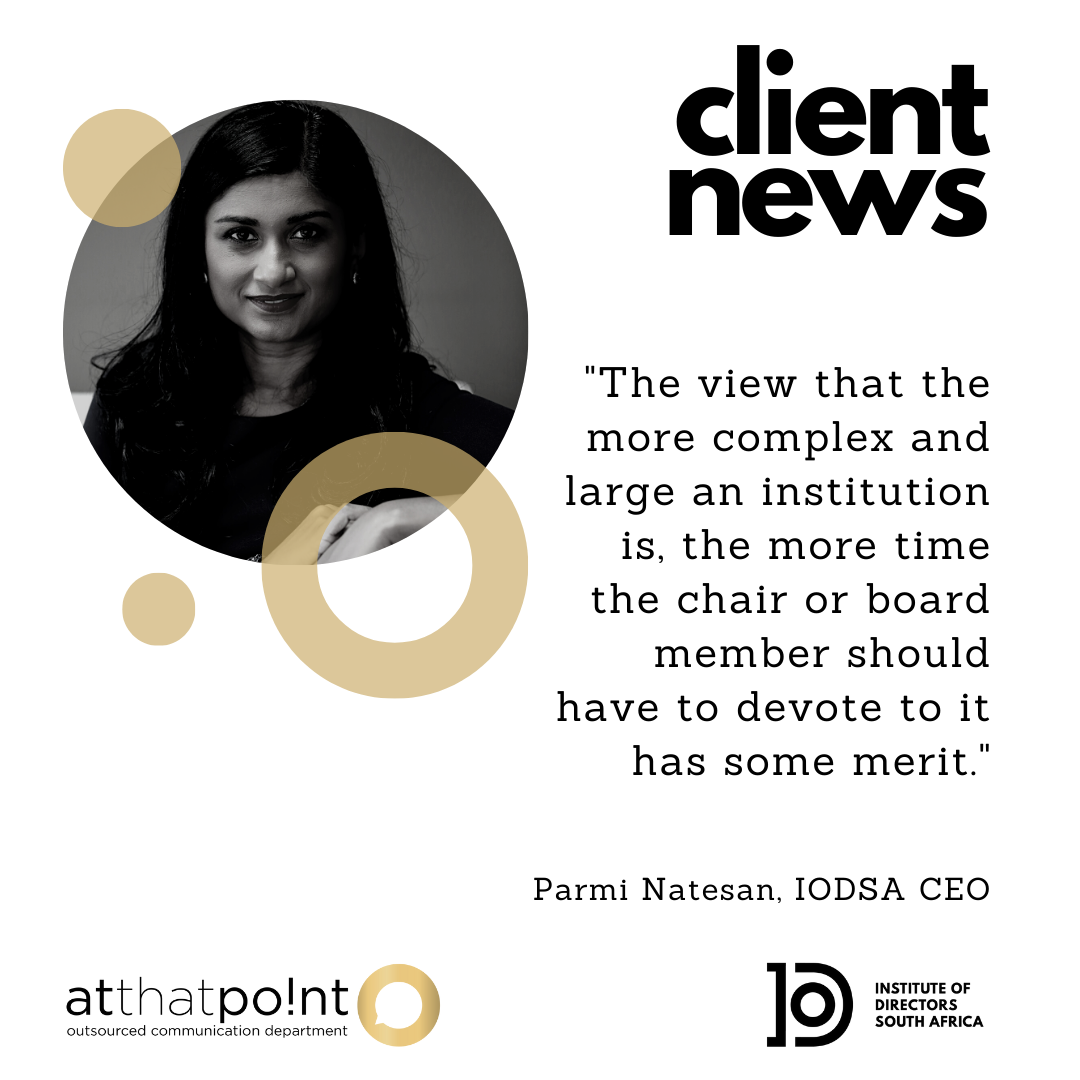
 RSS Feed
RSS Feed